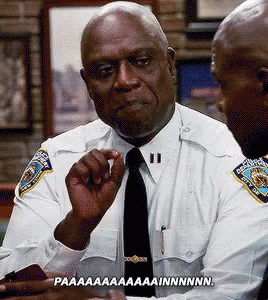#his portrayal of holt will always be iconic
Explore tagged Tumblr posts
Text

how i’m feeling today and probably the rest of my life:




RIP Andre Braugher. gone too soon but never forgotten. thank you for bringing Raymond Holt into our lives and beautifully portrayed a queer black man in power. i’ll always cherish you and Captain Holt in my heart 🤍🕊️
#no one could have played captain raymond holt as well as he did#this has been very shocking#rewatching b99 will not be the same#his portrayal of holt will always be iconic#alright i'm gonna go cry#gif credits to original owner(s)#andre braugher#brooklyn nine nine#brooklyn 99#b99#captain holt#raymond holt
4K notes
·
View notes
Text

Roger Howarth Says Goodbye to General Hospital
Roger Howarth has left General Hospital after playing the character of Austin Gatlin-Holt. Austin was shot and killed in the episode, which aired on November 17, 2023.
Howarth is a popular soap opera actor who gained recognition for his portrayal of Todd Manning on One Life to Live, which earned him a Daytime Emmy Award in 1994. He is considered an icon in the soap opera genre. Howarth left One Life to Live in 2003 and joined As the World Turns, where he played the character of Paul Ryan until the series ended in 2010. He returned to One Life to Live in May 2011 and continued his role on General Hospital in March 2012. However, he later exited the series in March 2013 and returned.
Howarth returned to General Hospital as Franco, a character formerly created and portrayed by James Franco. When this character was written off in March 2021, Howarth returned two months later as a new character, Austin Gatlin-Holt, and has played the role ever since. In a goodbye post on Instagram, he wrote, "Till life with coffee and rabbit ear. Three things that I know for sure…1 Daytime fans are lovely and amazing and supportive and dedicated and I am deeply grateful to each sparkly one of them. 2 I enjoyed my time at General Hospital and wish the cast and crew the best and continued success. It was a pleasure working with you all. 3 Life is amazing. We just don’t Ever know what’s gonna happen. How great! Turn toward the light. Always. Huge thank you to you all."
X
**This is such a huge mistake. Roger is a supremely talented actor who was given a crappy story to play.. He shined as Franco and I don't know who's idea it was to make him play a different character, but it was a huge mistake. Now Roger has a chance to show another show what he is made of. Terrible decision GH!!
6 notes
·
View notes
Photo

STAGECOACH (’39): America on Celluloid by Greg Ferrara
There’s a tendency in the study of any art form to pin down the work that gave birth to a new movement in a particular medium. Miles Davis’ album Kind of Blue was seen, then and now, as a gateway to greater exploration in jazz improvisation and a solidifying of the cool jazz dominance over bebop and swing. James Joyce’s Ulysses was seen as the modernist novel’s seminal moment, the foundation of a movement in literature still expanding outward to this day. And the cinema is no different. But while many might turn to the works of Eisenstein or Griffith as setting up the language of cinema, or Welles for bringing it all together in the sound era, my personal choice has always been John Ford’s STAGECOACH. It is the perfect synthesis between silent and sound, comedy and drama, intimate tale and epic adventure. And in its very story and personal prejudices, the perfect representation of American film.
It is an oft-told story that Orson Welles watched STAGECOACH numerous times in preparation for making CITIZEN KANE (‘41). Whether this is true or not (Welles was quite the teller of tall tales) matters not so much as the fact that Welles knew STAGECOACH was the movie to watch if you wanted to learn about cinema. But STAGECOACH is also the film to watch if you want to learn something about American history. No, not because it portrays anything remotely close to actual history, but because its portrayal of Native Americans reflects the attitudes of most Americans in the 1930s, and this very unsympathetic and barbarous portrayal colored the image of the Plains Indians for decades to come. STAGECOACH, in both cinematic form, and questionable morality, is quite possibly more American than any other work of cinema. To paraphrase a line from Francis Ford Coppola, “STAGECOACH isn’t about America. STAGECOACH is America.”
At the center of STAGECOACH is an outlaw named Ringo. The character was played by John Wayne and it simultaneously invented Wayne as a personality and the cowboy as the icon of American individualism. From the introductory shot of Ringo stopping the coach by brazenly standing it down, and every shot after, Ringo is portrayed in a heroic light. He’s an outlaw, but the kind Americans understand. He fights the good fight, even if it breaks the law. He’s a man of principle above all else. Even now, in the story, he is a fugitive but one on a moral mission, to kill those that killed those he loved.
The other characters play around Ringo and play off the idea of American archetypes. There’s the Southern gentlemen from Virginia, Hatfield (John Carradine), standing in for the myth of the Noble Cause, perpetuated by the Dunning school of thought so prominent at the time. His service in the Confederacy is seen as an admirable thing, and it is revealed that he was under the command of the father of one of the other coach passengers, the pregnant Lucy Mallory (Louise Platt). He’s a scoundrel and a gambler, to be sure, but a man who will take a bullet for a lady.
There’s the prostitute, Dallas (Claire Trevor), standing in for, and against, America’s ongoing battle with its Puritan origins. Dallas was run out of town by a “moral” society, and several years into the Depression— and only a few years after the repeal of Prohibition— Americans were weary of moralizing prudes. Movies like STAGECOACH obliged by including the “prostitute with a heart of gold” character whose struggles the average American could understand.
There’s the corrupt banker (Berton Churchill), the stalwart marshal (George Bancroft), the everyman coach driver (Andy Devine), the cavalry officer (Tim Holt), and, of course, the one-dimensional, violent, and savage Plains Indians. STAGECOACH perfectly sums up just about every myth an average American believed in 1939, or wanted to believe: The war between the states was a noble effort by the South; savages in the West were trying to stop the westward destiny of Americans; and the American man was a virile, no-nonsense man of principle who fights for justice, even at the risk of his own freedom.
Conspicuously absent from all of this is any sign of the people who built the nation back east (African slaves) or made possible the expansion into the west (Chinese laborers). America moves westward using the fruits of their labors but denying them the same benefits. Non-Europeans were not yet a part of the American mythos, and their absence signals as much. What’s fascinating is that in the effort to paint the stagecoach travelers as individualists marching towards destiny against the primitive tribal hordes who would hold them back, the story ends up painting a far more accurate picture of the American story than it knew. Just not in the way it intended.
And all of it filmed by John Ford in the most extraordinarily fluid way imaginable. The camera rolling up to Ringo’s face, the crouched interior of the coach, the high-speed tracking shot of Ringo making his way under the coach, the quick cut edits of the final chase/battle, the cavalry coming to the rescue, and the use of Monument Valley as a backdrop for the frontier of the West— all of it done so expertly as to remove all doubt why anyone would want to watch it 40 times to understand how movies are made.
I have never been of the school of thought that we should avoid works of art from previous eras because they no longer fit into our desired societal models or don’t feel calibrated to our current moral compasses. Just the opposite, I find such work all the more important as a living document to our past beliefs, bigotries and rituals; to our stories and legends and national religions. And any iconic American work should be a work that outrages as well as intellectually invigorates. Any movie that can claim a right to be the seminal work of American filmmaking, to be representative of America at the time it was made, and perhaps long after, almost has to be offensive on some, or many, levels to mesh with the rich, complicated, inspiring and yet troubled history of this country. STAGECOACH is that movie, and to that end I believe it is the most deeply American movie ever made.
#FilmStruck#Criterion Collection#John Ford#Stagecoach#John Wayne#StreamLine Blog#Miles Davis#Greg Ferrara
39 notes
·
View notes